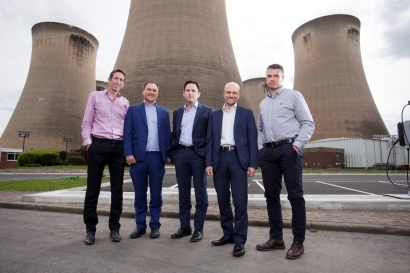
The demonstration project will see Drax partner with Leeds-based C-Capture and invest £400,000 ($538,000) in what could be the first of several pilot projects undertaken at Drax to deliver a rapid, lower-cost demonstration of BECCS.
Drax Power Station became the largest decarbonization project in Europe by upgrading its existing facilities and, if this pilot is successful, it will examine options for a similar re-purposing of existing infrastructure to deliver more carbon savings.
A report by the Energy Technology Institute in 2016 has suggested that by the 2050s BECCS could deliver roughly 55 million tonnes of net negative emissions a year in the UK – approximately half the nation’s emissions target. The technology provides a means to take the gases that cause global warning and removed them from the atmosphere at the same time as electricity is produced.
The first phase of the project, starting this month, will look to see if the solvent C-Capture has developed is compatible with the biomass flue gas at Drax Power Station.
A lab-scale study into the feasibility of re-utilizing the flue gas desulphurization (FGD) absorbers at the power station will also be carried out to assess potential capture rates.
Depending on the outcome of a feasibility study, the C-Capture team will proceed to the second phase of the pilot in the autumn, when a demonstration unit will be installed to isolate the carbon dioxide produced by the biomass combustion.
Will Gardiner, CEO, Drax Group, said, “If the world is to achieve the targets agreed in Paris and pursue a cleaner future, negative emissions are a must – and BECCS is a leading technology to help achieve it.
“This pilot is the UK’s first step, but it won’t be the only one at Drax. We will soon have four operational biomass units, which provide us with a great opportunity to test different technologies that could allow Drax, the country and the world, to deliver negative emissions and start to reduce the amount of carbon dioxide in the atmosphere.”
BECCS has been identified as one of several greenhouse gas removal technologies that could remove emissions from the atmosphere and help achieve long term decarbonization.
C-Capture is a spin-out from the Department of Chemistry at the University of Leeds, established through funding from IP Group Plc.
Chris Rayner, founder of C-Capture and Professor of Organic Chemistry at the University of Leeds, said, “We have developed fundamentally new chemistry to capture CO2 and have shown that it should be suitable for capturing the carbon produced from bioenergy processes.
“The key part is now to move it from our own facilities and into the real world at Drax. Through the pilot scheme we aim to demonstrate that the technology we’ve developed is a cost-effective way to achieve one of the holy grails of CO2 emissions strategies – negative emissions in power production, which is where we believe the potential CO2 emissions reductions are likely to be the greatest.”
Photo: L-R: Jason Shipstone, Head of R&D, Drax Group; Caspar Schoolderman, Director of Engineering, C-Capture Ltd; Andy Koss, CEO Drax Power; Prof Christopher Rayner, Technical Director, C-Capture Ltd; Carl Clayton, Research and Innovation Engineer, Drax Group.

